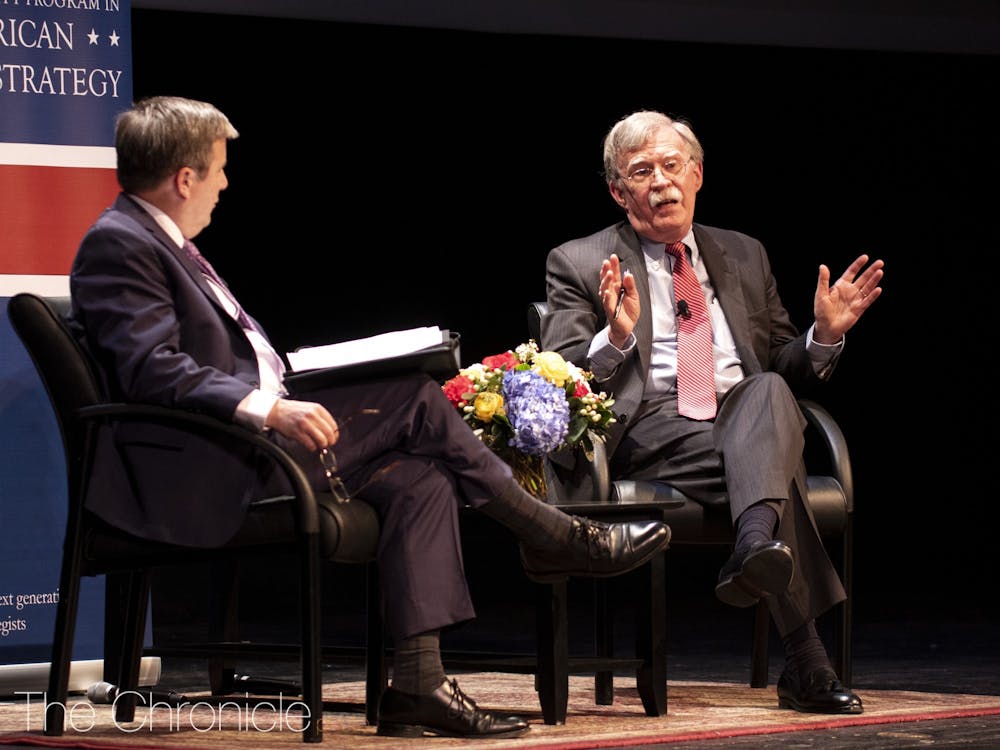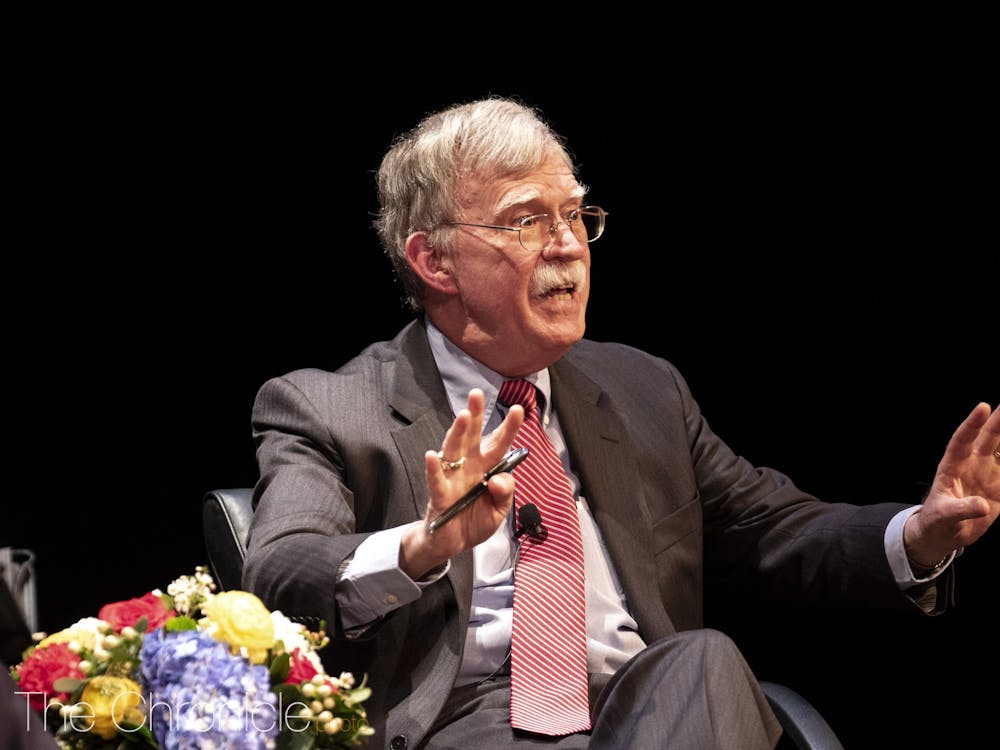With protesters outside his Monday night event, John Bolton, former national security advisor to President Donald Trump, made his first public appearance since the launch of the impeachment inquiry at a packed Page Auditorium.
Bolton, also a former U.S. ambassador to the United Nations, repeatedly refused to answer questions on the specifics of his time in the Trump administration amid White House “censorship” of his book, as he described it. However, Bolton did provide his perspective on American foreign policy toward countries like China, North Korea and Iran. Peter Feaver, professor of political science and public policy and American Grand Strategy director, moderated the AGS talk.
Bolton spent a large part of the talk referring to his upcoming book, currently pending White House classification review, as why he couldn’t answer questions.
In late January, during the Senate impeachment trial of Trump, leaked segments from Bolton’s unpublished manuscript showed that Trump had stated clearly plans to leverage security assistance to Ukraine to push for the government’s assistance investigating the Biden family, which would oppose Trump’s defense that blocking the aid was independent of his requests for the investigation. However, witnesses were never called to testify and Trump was acquitted Feb. 5.
The talk featured much more foreign policy discussion than conversation about impeachment, however. Bolton identified his successful policies as those protecting American sovereignty and protecting American allies from being delegitimized by American opponents, citing constitutional order and the idea of America as “an exceptional nation” as his primary motivators.
He referenced the 1991 United Nations decision to revoke most of a resolution that equated Zionism with racism, a resolution he described as “a clear effort to delegitimize the state of Israel.” He also pointed to the George W. Bush administration decision to unsign the statute that created the International Criminal Court and Trump administration withdrawal from the Iran Nuclear Deal as successful plans.
“I was on cloud nine that day,” Bolton said of the withdrawal from the Iran Nuclear Deal.
Prior to serving in the Trump administration, Bolton held positions in the State and Justice Departments during the Reagan and George H. W. Bush administrations.
When asked how he’d evaluate the 2003 decision to invade Iraq in hindsight, Bolton deflected the question.
“I really had very little to do with Iraq policy in the Bush administration,” he said. “When I am called an architect of the policy, I feel flattered, but I had nothing to do with that aspect of it.”
Bolton stressed that he was not the security decision maker but was instead the “national security advisor.”
Throughout his career in international policy and affairs, Bolton has pushed for regime change in countries like Venezuela and North Korea as well as Iran, and has declared the nuclear deal with Iran to be a futile sham.
Bolton argued that regime change, the only solution in Iraq according to him, would go better in Iran.
“Iran is a different country than Iraq. The circumstances are very different. The issues are very different, and the means of accomplishing the regime change would be very different,” he said. “The problem is the belief that the current regime in Tehran will change its behavior in a way that moves it away from the pursuit of deliverable nuclear weapons”.
Bolton argued that the Obama administration’s policy allowed Iran to continue in their objective of building a nuclear weapons program.
He expressed similar thoughts in regard to the killing of Iranian Major General Qassim Soleimani, disregarding the absence of an “imminent threat” for the attack as an issue or apprehension of Iranian retaliation. He said America should have taken out Soleimani sooner than it did.
“If you fear Iranian retaliation for taking out Soleimani now, what would you fear when Iran has deliverable nuclear weapons?” he asked the audience.
Bolton also called the current efforts to negotiate with North Korean leader Kim Jong-Un “doomed to fail.”
“North Korea in the last 40 years has on four separate, memorable occasions publicly committed to get rid of nuclear weapons and just never seems to get around to doing it,” he said.
Sanctions, he argued, will pressure them to get rid of weapons, which works only in the short term.
Get The Chronicle straight to your inbox
Sign up for our weekly newsletter. Cancel at any time.
“We’ve given them two years more to advance their program,” he said. “Time is almost invariably on the side of the proliferator.”

When asked why he joined an administration that is doing exactly the opposite of what he recommended in terms of nuclear policy with North Korea, his opinions on Trump’s meeting with Putin in Helsinki and what he thought about Trump’s tweets, Bolton cited the prepublication review of his book as the reason why he could not comment.
“I say things in the manuscript about what he said to me,” he said. “I hope they become public someday.”
Questions from the audience were submitted in advance of the event and read off by Feaver, one of which inquired why Bolton would comply with a Senate subpoena but not a House subpoena, which was subsequently met with applause from the audience.
Feaver noted in the Ambassador Dave and Kay Phillips Family international lecture that the larger mission of AGS is to “raise the next generation or strategists by studying previous strategists.”
“That only works if we have a climate of respect and inclusion to reflect the diversity of opinion that is contained in American foreign policy,” he said.

Preetha Ramachandran is a Trinity senior and diversity, equity and inclusion coordinator for The Chronicle's 118th volume. She was previously senior editor for Volume 117.

